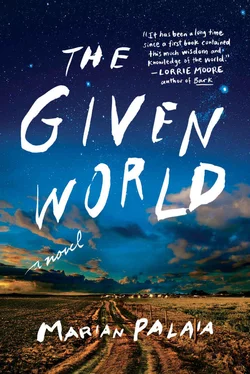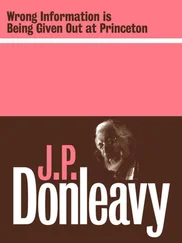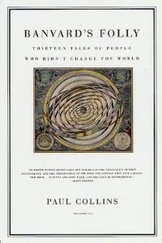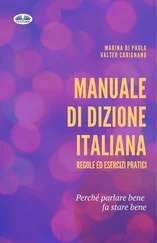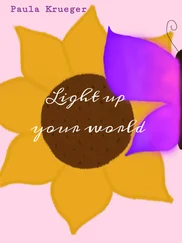I find my old helmet, and it still fits; the bike, after a bit of tinkering, runs fine, smooth, strong. I don’t usually stay gone more than an hour or two, and Dad mostly sleeps now anyway. For a while, he tried to do things the living do, like go out to the mailbox for the paper, rehang a picture that has fallen off the wall, cook eggs, play a whole Scrabble game. But it is all too much, too hard, and only deepens the lines in his face, exaggerates the curve in his back.
His frustration — with himself, with his lungs — shows in every movement, but he never says a word about it. He gets up in the morning for coffee and cornflakes and then goes back to bed. We, or I, if Mom is off wandering, generally see him again for supper, but except for rare occasions, that’s the extent of it. Unless I go and watch him sleep, which sometimes I do just to make sure he’s still breathing. It’s not always easy to tell. I catch myself trying to do it for him.
Mom has carved out a trail of sorts: a circuit that sometimes does lead to her lying on the railroad tracks, but the train stopped running on our spur before I was even born, and I hardly think that’s the point anyway.
There is an almost infinite number of back roads I can travel around here, to places where humans almost never go. The land is much flatter than it is west of here, but not as flat as people imagine when they think of the plains, and the roads do turn, and they do rise, and they do fall. There are mountains, even, scattered ranges disconnected from each other, and massive buttes like altars.
Sometimes I drive through the towns — deliberately, slowly, to see the people, maybe to feel some connection to them. It is summer, so there is no school, and small cadres of young men, both Indian and white, roam the streets, maybe in search of — like I once was — something to keep them here. I tell myself I am not looking for a certain face, for the father or the son, but of course I am, and sometimes I will circle a block two or three times to make sure. The white boys eye me suspiciously, but the other ones don’t give anything away. Nothing at all. In the towns, I do not find what I am not looking for.
I haven’t yet had the nerve to go onto the rez, so I get as close as I can, circling it on the boundary roads, seeing ghosts and real evidence of all the too-slow or terminally indecisive animals flattened on this stretch of highway. Fence posts that once cast a fairly regular pattern of shadow across the road are mostly down now, or lean into each other at crazy angles. I hear there has been some kind of economic upswing in this country over the past few years. The news does not seem to have reached this place yet.
One night, while I am outside lying in the grass, Mom comes with her own beer to join me. She sits cross-legged, making moustaches with her hair as her head bobbles like one of those baseball dolls, like it’s on a spring. She’s humming something that sounds like “I’m an Old Cowhand,” the shaking of her head adding a just-perceptible vibrato.
After a while she says, “Your brother—” and then she stops. But she has said it in such a way — or I have heard it in such a way — that for a second I think the rest of the sentence is going to create an entirely new reality; that she is going to tell me he really has been holed up in a cave in the mountains all this time — emulating Ho Chi Minh, writing his memoirs, collecting fossils and painting hieroglyphs — and that now he is ready to come home.
What she says, though, is, “When he was a baby, I could make him stop crying by singing that song. Just that one. He’d watch my mouth like it was some magical animal, making a sound only he could decipher. It worked every time.”
“What about me?” I say. “Did it make me stop crying too?”
“You never cried,” she says. “Never.”
I don’t believe it. No one doesn’t cry.
Then she tells me it worked on Slim too.
“Slim,” I say, as if I am trying to place the name. I say, “I did this all wrong, didn’t I? I fucked everything up.”
She goes back inside. She doesn’t have time for this.
• • •
I start a new letter to Darrell, even though I haven’t a clue where to send it.
They say tourists are flocking to Vietnam now. It is the new Thailand, or Bali; take your pick. Cheap hotel rooms and beer, the utter cachet of it all. Củ Chi has gotten so busy they have had to expand. They’ve opened up and widened tunnels the B-52s caved in. They find bones, dog tags, rotted scraps of green fatigues. DNA. They send letters that read something along the lines of: “We think we may have found someone you knew a long time ago. In another lifetime.” (That part, truthfully, they do not come right out and say.) Our letter is in the kitchen. It moves from table to counter to windowsill, apparently of its own accord. The dog tags will come soon. The bones after. Where are you?
Both our rooms are pretty much the way we left them. The dust is thick, but not twenty-five years’ thick. My mother has written her name in it, on the bookshelf in Mick’s room. “Rose,” it plainly says, with an arrow through it, but no heart. I pick up an old notebook, from a geology class Mick took in college. In his angled and rambling script, I read, “One section = one square mile = 640 acres. Sections are not always nice and square. Due to the geology and uneven surface of the earth, its curvature and the failure of neighboring sections to ‘butt up’ perfectly, there may be variations.” At the bottom of the page he has written, “Failure to butt up = Withholding of affections. Refusal to spoon. Spooning leads to forking, etc., etc., etc.”
No wonder he left. He must have been bored out of his skull. He probably knew more about rocks, and what’s under them, than the teacher did. All those books. All that digging.
• • •
It is late afternoon. I have circled the reservation twice. I am blindingly sad but afraid to explore, to even locate, all the precise causes. That is so me. I have always been so good at this.
A rise comes; I clear it, it flattens out, and there is a boy — no, a young man — standing in the dust and rocks beside the road. He is tall, lanky, and he has a bird. He is not actively hitchhiking but looks instead like he is waiting for a prearranged pickup. I’ll meet you at four, at the corner of nowhere and nowhere else. I slow the bike down, ease her onto the dirt. Take off my helmet. I see that the bird is a falcon, hooded, talons clamped to a piece of leather around the young man’s forearm, which he holds at an angle slightly away from his body, as if it is set in an invisible cast, held by an invisible sling.
I am afraid to look at his face, but I don’t have to. Something about the way he stands, slouchy but graceful, entirely comfortable in his skin. And his hands are identical to Darrell’s. Once I know, I can look up to see he looks like both our fathers, his and mine. That I did not expect. His eyes did not stay blue, but they are not completely green, either. They are nearly the color of the Flathead River in spring, when the glaciers begin to melt and turn the water turquoise. I wait to see how this is going to feel, and think it will be bad, but it is more a sense of déjà vu, a sense that I am dreaming, or that I am watching myself dream. Here he is. He was born. He survived. He grew up.
My voice, incredibly, works. “Can I give you a ride somewhere?”
He nods once, so slowly it is almost a bow, and mumbles something about “grateful,” something about “ma’am.”
Even though on the outside I am perfectly calm, on the inside I feel that bird’s wings flapping frantically in my chest. I imagine my heart could stop any second now. There is, you know, always the possibility.
Читать дальше
